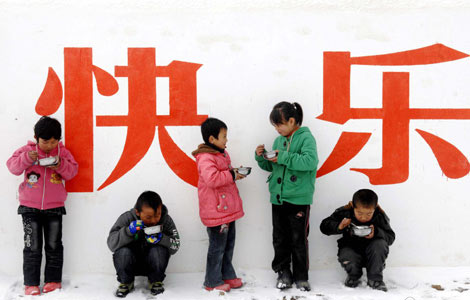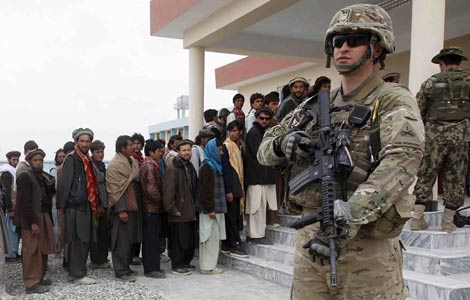 |
|
|
|
|||||||||
Improving local people's lives is way to maintain stability in region
Violent events in the Xinjiang Uygur autonomous region are being used by separatists to create ethnic tensions and make simple problems complicated, an officer from Xinjiang Armed Police Regiment said.
"Those violent events are isolated cases, but overseas separatists like to politicize and internationalize them," said Hou Xiaoqin, political commissar of the regiment.
|
 |
|
Zhang Chunxian, Party chief of the Xinjiang Uygur autonomous region, meets the media workers at Xinjiang TV Station's studio for the NPC and CPPCC sessions in Beijing on Monday. [Cui Jia / China Daily] |
Due to its strategic location, Xinjiang has been facing threats from foreign-based groups, which pose the greatest challenge to the regiment.
Zhang Chunxian, Party chief of Xinjiang, said on March 7 that acts carried out by separatists, extremists and terrorists were against the human race. It was not a religious problem or an ethnic one.
Hou said that was the reason his regiment will maximize its advantages and strike hard against those who commit such acts.
"The regiment has always played an important role in dealing with emergency incidents, but its fundamental role is to strengthen ethnic unity at the grassroots level," he said.
Three violent attacks were carried out in southern Xinjiang's Kashgar and Hotan areas last year and another happened last month.
Xinjiang borders Russia, Mongolia, Kazakhstan, Kyrgyzstan, Tajikistan, Afghanistan, Pakistan and India. It has abundant oil reserves and is China's largest producer of natural gas.
To build a better relationship with local people, the regiment has since 2009 required its members to learn about ethnic and religious policies, Xinjiang's history, culture and local languages. The force now has a better understanding of the region and its people, Hou said.
Hou said that the regiment makes great efforts to help local people, especially children and young people. The force has donated money to children throughout Xinjiang who couldn't afford to go to school.
The regiment has also invested more than 3.4 million yuan ($537,300) in improving teaching facilities in Urumqi, Kashgar and Tacheng. More than 170 primary and high schools have been paired up with nearby forces for various programs.
To maintain social stability at the grassroots level, retired officers from the regiment are encouraged to stay in Xinjiang and work in local police forces. More than 800 retired officers have been recruited around the region in the past three years.
"Without a stable social environment, Xinjiang, especially in the frontier areas, could not be further developed," he said. "Only when people's lives have been improved can the region's stability be improved."
Contact the writer at cuijia@chinadaily.com.cn
Wu Ying, iPad, Jeremy Lin, Valentine's Day, Real Name, Whitney Houston, Syria,Iranian issue, Sanyan tourism, Giving birth in Hong Kong, Cadmium spill, housing policy

|

|

|

|

|

|